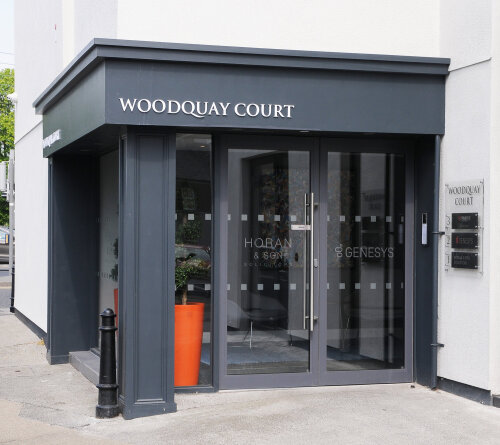Best Collaborative Law Lawyers in Galway
Share your needs with us, get contacted by law firms.
Free. Takes 2 min.
Free Guide to Hiring a Family Lawyer
List of the best lawyers in Galway, Ireland
About Collaborative Law in Galway, Ireland
Collaborative Law is an alternative dispute resolution process that is gaining traction in Galway, Ireland. It offers a unique and amicable way for individuals, especially families, to resolve legal issues outside of court. This process involves both parties engaging collaboratively with the guidance of specially trained lawyers, to negotiate and settle disputes respectfully and in a cost-effective manner. The goal is to reach a mutual agreement that satisfies both parties, thus minimizing conflict and preserving relationships.
Why You May Need a Lawyer
There are several common situations where individuals in Galway may require legal help in Collaborative Law. These include divorce or separation, child custody and access disputes, property settlement, and other family law issues. By choosing Collaborative Law, individuals can often avoid the adversarial nature of the courts, working instead towards a mutually acceptable solution with the help of their lawyers. It is particularly beneficial for those looking to maintain civil relationships post-resolution, such as parents co-parenting children.
Local Laws Overview
In Ireland, including Galway, Collaborative Law operates within the framework of the broader Family Law but emphasizes out-of-court settlements. Key aspects include:
- Both parties must be committed to solving the issue collaboratively, typically signing a participation agreement.
- Lawyers representing both parties are specially trained in Collaborative Law and facilitate discussions rather than taking adversarial positions.
- If negotiations break down, the collaborative lawyers cannot represent the clients in court, encouraging a genuine collaborative effort.
- Since the process is driven by negotiation and agreement, it offers flexibility and privacy not found in court proceedings.
Frequently Asked Questions
What is the primary benefit of choosing Collaborative Law?
The primary benefit is the ability to solve disputes without going to court, which can save time, reduce costs, and allow for more amicable solutions.
Can any legal issue be resolved using Collaborative Law?
While Collaborative Law is particularly effective for family and interpersonal disputes, not all legal issues are suited for this method, particularly those requiring formal legal intervention.
Do I need a lawyer specifically trained in Collaborative Law?
Yes, you need a lawyer trained in Collaborative Law to ensure the process is respected and handled properly, fostering true collaboration between parties.
What happens if we cannot reach an agreement in Collaborative Law?
If an agreement cannot be reached, both clients must seek new lawyers for any court proceedings, as the collaborative lawyers cannot represent them in court.
How long does the Collaborative Law process typically take?
The timeline can vary depending on the complexity of the issues and the cooperation level between the parties, but it's generally faster than court litigation.
Is the agreement legally binding?
Once an agreement is reached, it can be drafted into a legally binding document by the lawyers, which is then enforceable by law.
Are there risks involved with Collaborative Law?
While Collaborative Law aims to be a peaceful dispute resolution process, there is a risk of not reaching an agreement, resulting in additional time and costs if court proceedings become necessary.
What is the role of a collaborative lawyer?
A collaborative lawyer assists in negotiating terms that meet both parties' needs, encouraging open communication and proposing fair and innovative solutions.
Is Collaborative Law confidential?
Yes, the process is confidential, allowing parties to discuss matters openly without worrying about it being used against them in court.
Who pays for the legal costs in Collaborative Law?
Legal costs are typically shared or negotiated between parties, often less expensive than court proceedings due to efficiencies gained in the collaborative process.
Additional Resources
For those seeking further assistance or information, the following resources may be helpful:
- Law Society of Ireland: Provides details about qualified collaborative lawyers.
- Citizens Information: Offers guidance on legal rights and processes in Ireland.
- Galway Family Mediation Services: May assist with familial disputes resolved through mediation.
Next Steps
If you need legal assistance in Collaborative Law, consider the following steps:
- Research and choose a qualified collaborative lawyer.
- Prepare for initial consultations by outlining your main concerns and goals.
- Engage in the process with an open mind, ready to discuss, and negotiate solutions.
- Ensure all parties are committed to resolving the dispute collaboratively for effectiveness.
Choosing Collaborative Law in Galway can lead to peaceful, efficient resolutions, preserving relationships while meeting legal needs.
Lawzana helps you find the best lawyers and law firms in Galway through a curated and pre-screened list of qualified legal professionals. Our platform offers rankings and detailed profiles of attorneys and law firms, allowing you to compare based on practice areas, including Collaborative Law, experience, and client feedback.
Each profile includes a description of the firm's areas of practice, client reviews, team members and partners, year of establishment, spoken languages, office locations, contact information, social media presence, and any published articles or resources. Most firms on our platform speak English and are experienced in both local and international legal matters.
Get a quote from top-rated law firms in Galway, Ireland — quickly, securely, and without unnecessary hassle.
Disclaimer:
The information provided on this page is for general informational purposes only and does not constitute legal advice. While we strive to ensure the accuracy and relevance of the content, legal information may change over time, and interpretations of the law can vary. You should always consult with a qualified legal professional for advice specific to your situation.
We disclaim all liability for actions taken or not taken based on the content of this page. If you believe any information is incorrect or outdated, please contact us, and we will review and update it where appropriate.












